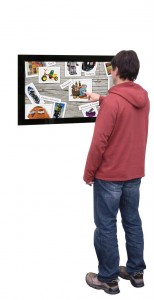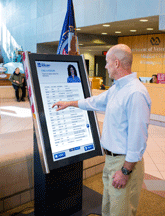Oct
Security within Interactive Digital Signage
Interactive digital signage security.
There are two ways of looking at this title; ‘Security within Interactive Digital Signage’
- How secure is the physical hardware in its public location?
- How secure is the software, when accessed by the public?
Outdoor and indoor digital media screens.
To answer both of these, we’ll look at scenarios where electronic signage or digital media screens are involved. Firstly the risk of damage; wilful or accidental needs to be avoided, so finding a suitable location is crucial, yet the best area is not necessarily the most beneficial for the customer. Outdoor LED screens require weather/temperature protection, guarding against unauthorized access, dust and liquid ingress and antiglare viewing screens. There are definitive products on the market, but specialist companies like DOOH can provide a turnkey solution to meet your needs; with a thermostatically controlled heater or cooling unit, antiglare glass or polycarbonate viewing window within a secure steel enclosure, which can be wall, ceiling or floor mounted. Indoor plasma screens also have their own issues, which can easily be overcome with a little foresight and strategic planning. Again the screens should be in fixed in public areas which are accessible and because of the convenience, deliberate damage is limited. There are and always will be occasions where someone will attempt to damage or break into the hardware – maybe to steal parts or just for sheer criminal behaviour. Damage limitation is key to looking after your investment.
Secure software for interactive digital signage screens
One reason consumers use interactive screens as part of their retail experience is to pay for goods. The retailers IT infrastructure must be compatible with that of a customer’s, but it is quite difficult to incorporate every network and operating system to oblige every shopper, however then main ones are readily available to consolidate. Retailers must protect the consumers’ security, as it includes pin-entry, telephone networks, barcodes and QR codes. These must be PCI compliant (payment card industry) to protect both parties. Allowing customers to enter the premises and access their WiFi with an untrusted device, puts th
e store and even further along the network, into jeopardy with severe consequences. Retailers can not enforce customers to conform their mini digital signage devices, however both parties need protecting and what information is passed between parties and organizations. Secure filtering content is one way to guard against inappropriate information. However, some information is very useful for the retailer to broadcast individually-tailored advertisements directly to the customer, based upon the information on their smart phone or tablet.
Multimedia digital signage
As retailers focus on widening their reach of customers via the internet; particularly through multimedia digital signage, low speed capability must be increased, filters need setting and VPN (virtual private network) increases security for each half of the transaction. This can become complex, and expensive to implement the additional software and employee skills, but the outcome of increased sales can be offset against the outlay.



